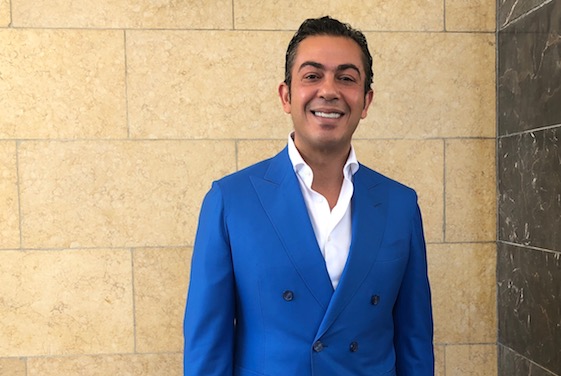GOSTELOW REPORT—“Look, the virus is changing priorities. I feel everyone is more human, and certainly my 330 colleagues are now more like family,” says Ayman Gharib, general manager of the 248-key Raffles Dubai Hotel, UAE.
“As is typical in UAE, we house all our employees, and the hotel’s nurses live in the accommodation so everyone has medical support,” he explained. The only day-to-day difference now is that instead of being able to socialize in the staff canteen, employees have boxed meals delivered to their two-person apartments. Day-off activities are curtailed, with Dubai’s beaches, malls and all entertainment closed. Gharib purchased lots of games, like Monopoly, which people borrow on a library-type basis.

The hotel, which is shaped like a pyramid, has an unusually understanding owner, Egyptologist Sheikh Mana bin Khalifa al Maktoum, whose Dubai business interests range from hotels and shopping malls to organic farming, carparks and waste management. Sheikh Mana does not have debt on the property, and unlike some speculator ownerships elsewhere, he has never had the word “exit” in his vocabulary. He is in the hotel world long-term: He is, indeed, in pre-opening stage at his forthcoming 501-key Sofitel Dubai Wafi, at the far end of his mammoth Wafi Mall from Raffles.
Sheikh Mana speaks to Gharib every day. “We said from the start we would not have any redundancies. Apart from the philanthropic aspect, it is so much more cost-effective not to have to re-hire later,” said Gharib, who passes what is happening on to his team. “I held a town hall meeting, being clear but blunt. I told them how it would be, and at the end several came to thank me.”
Back in his home country of Lebanon, Gharib originally aimed to be an architect. Interestingly, just as any designer needs clarity of briefs, he believes that, today, he
is on the receiving end of clear communication.
“I think Dubai’s government is doing all the necessary measures, in a very positive manner. They are speaking with one voice, reassuring people with great clarity via daily updates on social media and television, and through emails to companies — hotels are being contacted by Dubai Municipality, and by DTCM, the Department of Tourism and Commercial Marketing. The ruler of Dubai, Sheikh Mohammed bin Rashid Al Maktoum, and his son, the crown prince, have issued very heartfelt video messages,” he explained.
Gharib is also impressed with support from his brand. “One thing that Accor has taught me is to trust your local leaders. They are communicating brilliantly. I am very impressed.”
And so, despite the fact that his hotel’s restaurants, bars, and Egyptian-themed outdoor pool, plus the adjacent Wafi Mall, also owned by Sheikh Mana, are closed, he and his colleagues give tender loving care to the few guests who now more than ever call Raffles Dubai Hotel home. They can eat, what and whenever they like, in a lounge or in their rooms.
The hotel team is also working on full business coming back, whenever, though there continue to be added hurdles to overcome. Dubai’s lifeline, Emirates airline, stopped passenger flights last week, and Ramadan starts, depending on the moon, around April 24.
“Look, we continue to plan, and I know we will come back stronger,” promised Gharib.
